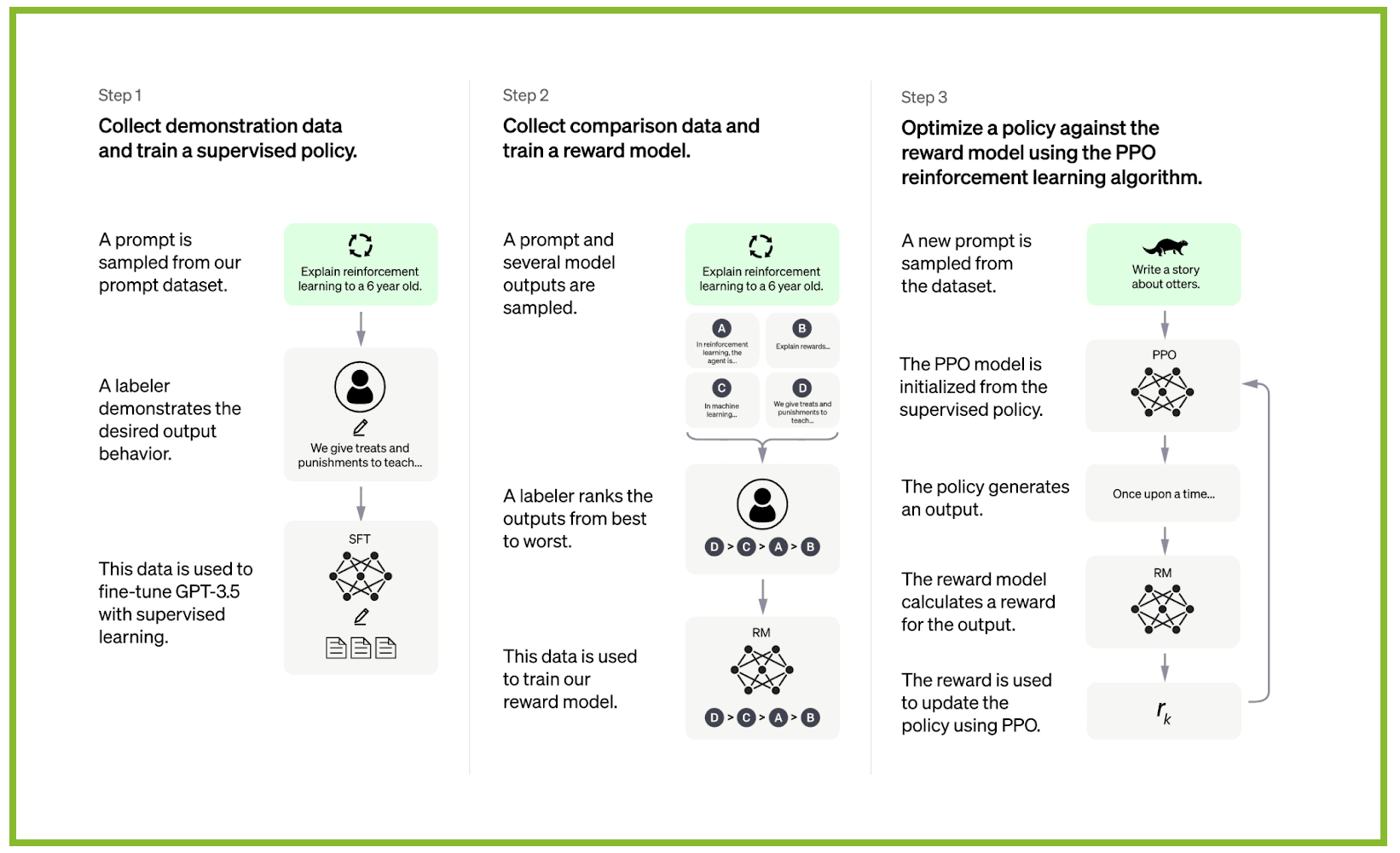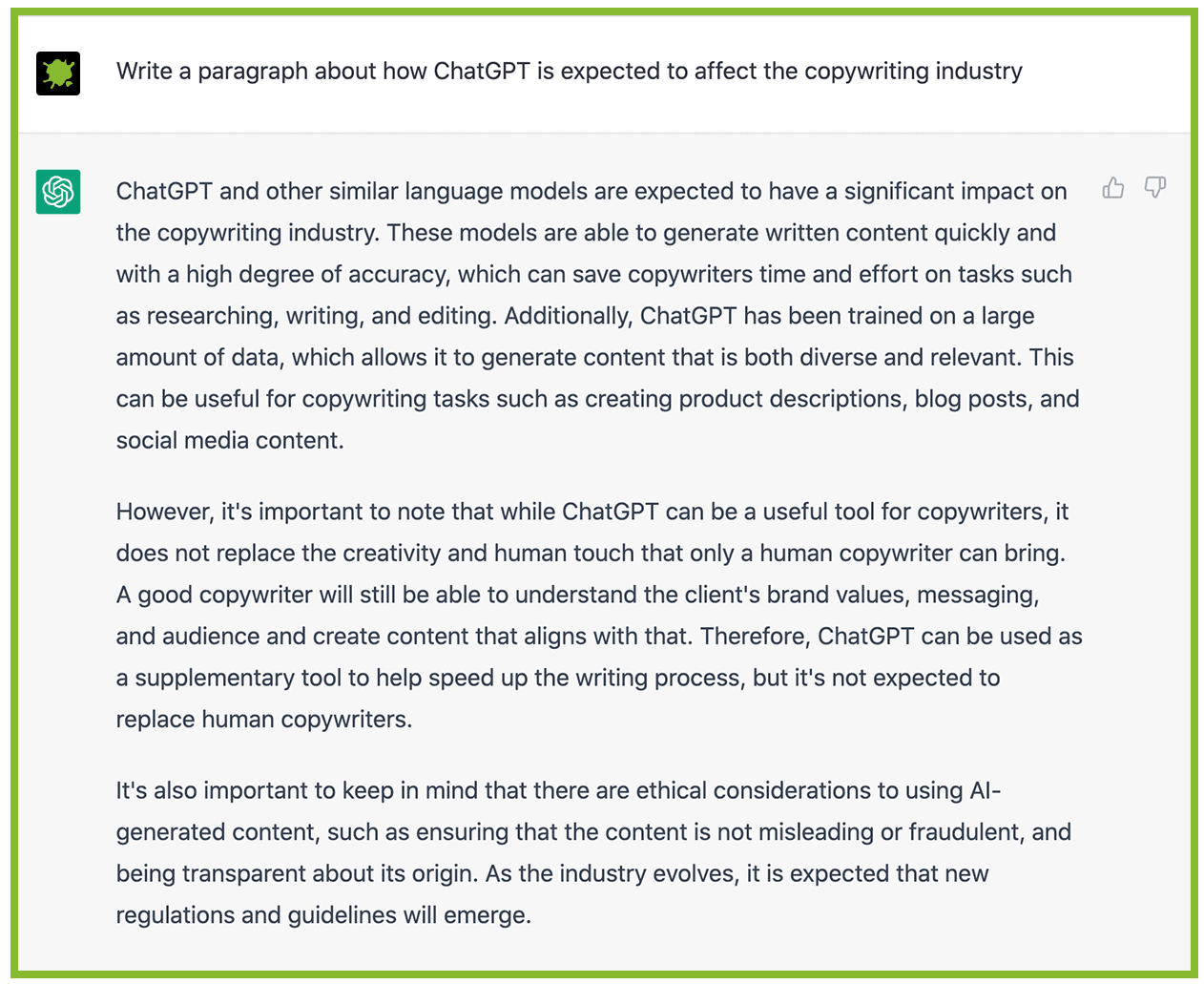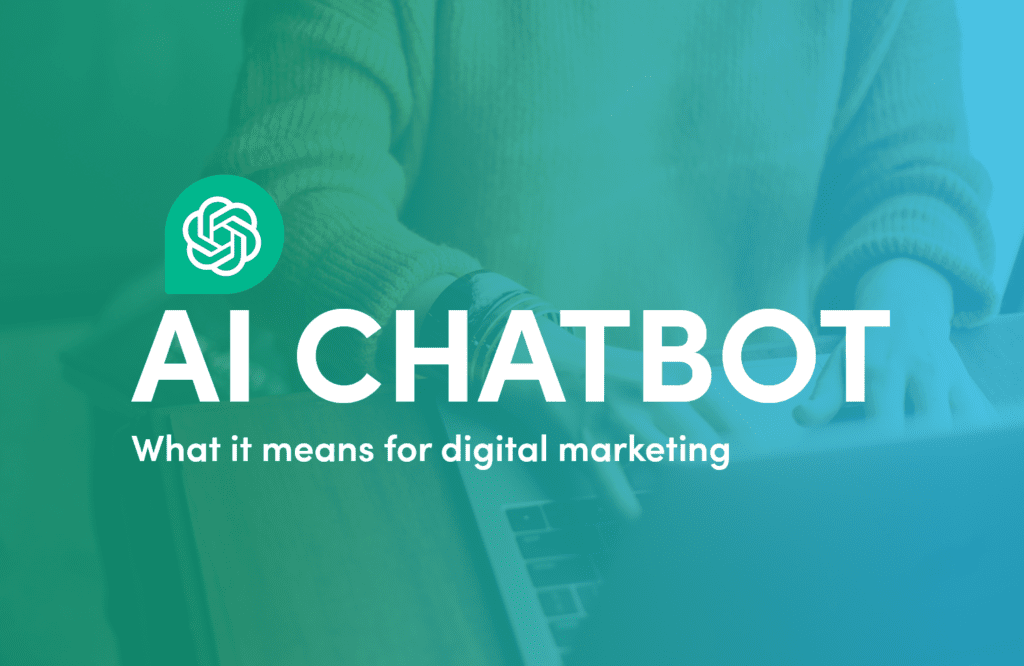ChatGPT has become the most in-demand AI chatbot almost seemingly overnight. Posts on LinkedIn about almost anything around the consequences or opportunities of ChatGPT are selling like hotcakes 🥞
We thought it was about time we got ourselves a slice of the pie. Just kidding 😉
ChatGPT is obviously a massive revelation in the digital marketing world. Nearly every digital marketer, from web developers to copywriters, and even account managers, are interested in what this new chatbot on the scene is all about.
There’s plenty of hyperbole around it. There are creatives adamant that AI could just never-ever take our jobs. On the flip side, there are plenty of creatives wondering if this could be it – the thing that finally takes that grunt work off of our plates forever.
Full disclosure, we haven’t taken a side just yet. There are plenty of unknowns involved, ethical questions, and a big grey area that needs navigating. So, we’re still chatting it through. Regardless of where we land on the day-to-day use of the tool, the technology itself is amazing and one that is no doubt one of the biggest advancements we’ve seen on the internet.
We can give you a run-through of everything that we’re considering, though 👇
Table of Contents
ToggleWhat’s ChatGPT? What’s the deal?
You’ve probably heard a whole heap about ChatGPT in the last month or two. It’s a new product from OpenAI that interacts with users in a conversational way. It’s not necessarily an AI copywriter or an AI developer – but it can certainly do both. It can craft responses for your customer support enquiries. And it can even come up with strategic ideas.
In fact, it rivals the capabilities of Google when it comes to search. Google calls for you to enter a few keywords around what you want to know, and then read the top results and come to your own answer. With ChatGPT, you can get a full answer, written in an easy-to-understand kind of language.
(But there are problems that lie in that, and we’ll get to those a bit later on.)
Currently, the creator, OpenAI, is running the AI chatbot for free. Anyone across the world is welcome to use it, totally free of charge. It’s so that openAI can teach the chatbot communication through trial and error. It’s a kind of machine learning called Reinforcement Learning from Human Feedback (RLHF), and in this case, OpenAI has opened up that learning process to the public (a pretty smart move).

ChatGPT isn’t the first AI copywriter (or defined as one at all). It might be the best so far, though. 🏆
While ChatGPT is for sure being used as an AI copywriter right now, it’s important to note that isn’t its sole purpose.
But is it better than the other AI copywriters on the market?
Yes, absolutely. By miles.
Where old AI copywriters relied on a full sweep of the internet and the stringing together of common themes, ChatGPT holds loads and loads of data and uses its informed prediction of relationships between words to turn it into a sentence that a human understands.

A replacement or a tool? 🔧
Right now, we’re not looking at ChatGPT as a solution to abolish our copywriting team. But we are looking at whether or not it can be utilised as a tool.
As it stands, misinformation is a real risk. While ChatGPT is for sure a fast learner, it can also fall victim to super convincing Google results that are… not quite right.
So, a human is still required to determine if the information is correct. But we’ll expand more on the misinformation aspect of ChatGPT soon.
It basically means that you can’t expect it to do all the thinking for you. It’s a useful tool and one that can help in the content creation process by brainstorming ideas and gathering information, but you can just hand the reigns over.
Then there’s the writing. ChatGPT writes surprisingly good content in a short amount of time, and it understands the complexities of tone of voice.
But that’s not necessarily what makes a good writer, of copy or content. Don’t get us wrong, it definitely is important.
But it’s the ability to connect and empathise through fun idioms, have a true understanding of the reader’s situation, and relate to the specific target market through references to pop culture and current events – that’s how we engage with our readers.
When it comes to writing, it’s the same again. It’s a really useful tool, but not a replacement. It’s ideal for taking over when you don’t know where to start or handing a draft over to for a little zhuzh.
We’ll expand on the empathy side of things soon, too.
Google’s crackdown on AI-generated content & the unexpected launch of Bard 🚀
Google has long been a fan of high-quality, engaging content that’s useful. In almost every Google algorithm update, the search engine is working to deliver more relevant and useful content to the searcher.
And, according to Google Search Advocate, John Mueller, AI-generated content is basically spam in the eyes of Google.
On Monday, the 6th of February, Google announced Bard, their own experimental conversational AI service.
“Bard seeks to combine the breadth of the world’s knowledge with the power, intelligence and creativity of our large language models. It draws on information from the web to provide fresh, high-quality responses.” - Google.
What does this mean for Google, algorithms, and AI-generated content?
We’re not totally sure at this stage. All we know is Google is taking this movement in technology seriously and is going to be adapting its own business model to keep up with the fast-paced nature of this software development.
Empathy is the most important feature of good copywriting. Can robots feel? 🤖
Unlike the 90s film Flubber and its star robot, Weebo, the general consensus is that no, robots cannot feel, and so, neither can artificial intelligence.
Well, for now.
Empathy is usually regarded as the key thing human copywriters have going for them. As humans, we can empathise with the thought process and emotions behind why someone is searching for what they are.
We have a pretty tight grasp of the customer journey and their pain points.
And sure, AI copywriters are advanced enough and enjoy the right algorithms to make sure they don’t open up a blog post with, “You’re planning a funeral. How exciting!”
But there are smaller, more niche idiosyncracies that still come into play here.
In fact, our Head of SEO, Rebecca Nordqvist, wrote her Master’s thesis on this exact topic.
Rebecca’s thesis, “Human Versus Machine: Human Connection And AI Copywriting Systems As Interpreted Through The AIDA Framework”, tested this exact theory.
She briefed a human copywriter and an AI copywriting system to create a Google Ad using the AIDA (Attention, Interest, Desire, Action) framework.
Rebecca was working to discover and understand the effectiveness of creating human connection through these kinds of advertising headlines.
To test and assess the effectiveness, a collection of people within the brief’s defined target market were surveyed, with structured interviews to follow.
Ultimately, the thesis found that an AI copywriter wasn’t as effective at aligning with human values. It was less effective at creating a human connection than the human copywriter.
It is worth noting that the thesis also explored the idea that with deep machine learning, perhaps it could be possible for artificial intelligence to understand human values and emotions better.
Is the information right?
A really big, important question is about the information and its quality. ChatGPT, in particular, uses a combination of research methods to create its responses. It uses data that’s already at its disposal, that human feedback learning we touched on earlier, and a round-up of Google.
But, not everything you read on Google is true. So, how does artificial intelligence separate the truths from the half-truths and the half-truths from the down-right lies?
A piece from The New York Times hears from Jeremy Howard. He’s the data scientist whose work inspired ChatGPT. He told the publication how thrilling it was to watch his daughter interact with the technology.
Howard specified something pretty important, though, “I also told her: Don’t trust everything it gives you. It can make mistakes.”

What about critical thinking?
Similarly to the empathy argument, artificial intelligence can’t think critically. In copywriting and content marketing, a large part of the research process is thinking critically.
At Excite Media, when we create a new piece of content for you, there’s a good chance a really similar piece has been created before. But, we’re always looking for a unique take on a popular topic.
We want to differentiate you from your competitors, and there’s no point in putting out the same ‘Top 10 X’ listicle that all of your competitors have published too.
We’re researching and digging deeper. If we created a round-up of the top 10 results on Google, then we’re just creating an echo chamber, really. We’re not adding anything, and there’s no reason for a user to engage, spend time on the page, and read further if the other four tabs they have open… say the exact same thing.
That’s not too far away from what ChatGPT is doing. That round-up is valuable, for sure. But we still need to do that deeper digging to make true on that promise to you – which is quality content.
ChatGPT makes acceptable content, but not great content. What it is great for is generating ideas quickly and streamlining that process that typically involves a chunk of your time and 32 Google tabs.

What about misinformation?
Let’s dramatise the situation a little bit.
We’re 10 years into the future, and ChatGPT is the go-to for all content creation. The same AI chatbot, using the same sets of data and the same information available to it, creates a vast majority of the content available online.
So, each time it does a sweep for new information, it’s interpreting its own content, again and again.
And what about misinformation?
The rise of TikTok saw Gen Z prefer TikTok over Google for its information. This quickly led to conversations about misinformation – with people on the app presenting dead-set misinformation as fact in a quick 60-second video.
If ChatGPT learns from humans and the existing content available, could it learn facts that… just aren’t facts?
It’s a pretty dramatic example, but it’s a simple way to say that ChatGPT creating a monopoly in this space could create a global echo chamber.
What we will say is that, even though ChatGPT is confident in its delivery, it doesn’t mean it’s right. So, exercise caution and keep your fact-checking hat on.
We’re actively looking into how we can use ChatGPT 🤓
If you’re an existing Excite Media client and are wondering what ChatGPT means for your content, there isn’t a heap to report.
We’re certainly interested in the potential of ChatGPT as a tool and are continuing to play around with different inputs and briefing techniques to see what it can produce.
But we are still weighing it all up.
Our conversations are currently revolving around what we’ve unpacked here. Misinformation and the Google implications.
As a lead generation agency, the other big thing we’re looking at is convertibility. If AI copywriters can’t empathise and think critically, how can they convert in an effective way? Can they build brand recognition and brand loyalty?
Everyone involved in your digital marketing strategy, from your account manager and SEO specialist to designers and copywriters, has a huge job to do here.
We’re looking at customer journeys, pain points and emotions behind actions – trying to create a connection between you and your target audience.
Currently, we’re investigating how ChatGPT can be used as a tool in this space while avoiding those potential negative repercussions we’ve walked you through.
So, we’re looking at how we can streamline research processes and the generation of new ideas. But of course, we’re also using critical thinking and making sure all of the information we gather is actually correct.

Even ChatGPT is self-aware, though 👇
Given the spirit of this article, we thought it’d only be fair to ask ChatGPT what it thinks about all this.
We gave the chatbot a really basic prompt, “Write a paragraph about how ChatGPT is expected to affect the copywriting industry.”
The response was scarily self-aware:
ChatGPT and other similar language models are expected to have a significant impact on the copywriting industry. These models are able to generate written content quickly and with a high degree of accuracy, which can save copywriters time and effort on tasks such as researching, writing, and editing. Additionally, ChatGPT has been trained on a large amount of data, which allows it to generate content that is both diverse and relevant. This can be useful for copywriting tasks such as creating product descriptions, blog posts, and social media content.
However, it's important to note that while ChatGPT can be a useful tool for copywriters, it does not replace the creativity and human touch that only a human copywriter can bring. A good copywriter will still be able to understand the client's brand values, messaging, and audience and create content that aligns with that. Therefore, ChatGPT can be used as a supplementary tool to help speed up the writing process, but it's not expected to replace human copywriters.





